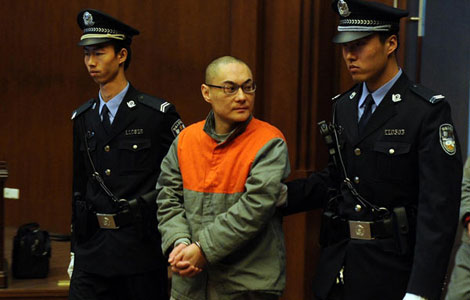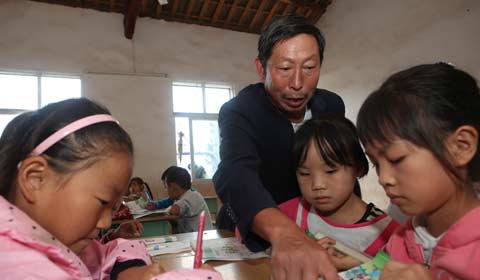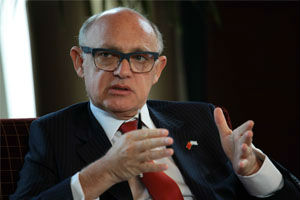Fosun to invest in US oil, natural gas sector
Updated: 2013-11-20 08:09
By DU JUAN in Beijing and MICHAEL BARRIS in New York (China Daily USA)
|
||||||||
Fosun Group, a broadly diversified, privately held conglomerate, said it will invest in the US oil and natural gas sector, amid growing energy demand in China.
Chief Executive Officer Liang Xinjun said the fast development of the US energy industry amid a supportive policy environment could lead to profitable investments. The US plan is the first step into the oil and gas business for the Shanghai-based company formally known as Shanghai Fosun High Technology (Group) Co.
"The key factor in overseas investment is the success rate," Liang told China Daily in an interview. "We have to ensure that, to be responsible to the shareholders."
The CEO said Fosun had been seriously considering investing in upstream energy businesses in the US for three or four years. Its past investments have included the real estate, medical services, insurance, media, steel and mining industries. Liang didn't provide a timetable for the latest investment.
"I have strong confidence in China's economy, driven by its growing middle class, which will greatly contribute to the country's consumption," said Liang. "In five to eight years, any industry in the world related to China's middle class will find big opportunities."
He said three major sectors — culture, travel and medical services — will see "huge growth" as a result of the country's growing middle class.
In the first half of this year, Fosun invested in three foreign companies: US high-end women's knitwear producer St John Knits International Inc ($55 million for a 33.3 percent stake); US-based Saladax Biomedical Inc ($22.5 million); and Israel-based cosmetic and medical lasers provider Alma Lasers Ltd ($221.6 million).
The company also invested in French resort operator Club Mediterranean SA, putting in 44 million euros ($58.9 million) in 2010, as well as Greece-based high-end retailer Folli Follie Group SA in 2011.
Liang said the company only invests in foreign projects where about 30 percent of the profit will come from the Chinese market within three to five years.
"We would like to invest in such foreign leading companies and bring their products or services back to China for local consumers," said Liang. "We never look just at cheap (overseas projects)."
Fosun prefers not to be the biggest shareholder in a project, which sends a signal of strong trust in the local management team and avoids conflicts with local communities, said Liang.
Many Chinese companies focus on "instant returns" from their overseas investments, which can lead to failures, said Li Ruogu, chairman of the Export-Import Bank of China.
He said China is still at the beginning stage of "going global", which most investors in the nation see as buying a mine or taking shares in foreign assets. These investors have limited knowledge of overseas investment conditions.
"Going global is a slow learning process," said Hellmut Schutte, vice-president of the China Europe International Business School in Shanghai.
He suggested that Chinese companies not "jump" during their overseas expansion. "Be slow rather than bold," he said.
In an interview last week, Harvey Fine, Fosun's managing director of global investments and strategies, explained the company's "value" investing strategy.
"When we look at value, we look at value relative to a price paid relative to the asset that we seek," Fine said on the sidelines of a business conference in New York. "For somebody else, they may feel were overpaying. We see the higher growth potential and they don't. We see value because China is untapped, and we know what our capabilities are in China. So for us, it is an undervalued asset."
In October, Fosun paid $725 million for One Chase Manhattan Plaza, the former world headquarters of Chase Manhattan Bank and a banking landmark in New York's financial district.
Fine said Fosun's investments are guided by myriad experts who are "really in the know – not just your run-of-the-mill consultants". This pool of expertise is invaluable in helping the company choose investments and in helping it adjust to market conditions as it pursues its global growth goals.
"We've had to transform ourselves continually as we grew," Fine said. "The founders built this business initially as a consulting firm, then eventually into an industrial holding company, then into an investment conglomerate. Along the way, we transformed our business model to take advantage of opportunities in the marketplace – initially in China, and now globally. We're leveraging our strengths where the opportunities are".
Contact the writer at dujuan@chinadaily.com.cn and michaelbarris@chinadailyusa.com

 Tourism year proves a big hit
Tourism year proves a big hit
 China is ready to send med team to Philippines
China is ready to send med team to Philippines
 150 years later, Lincoln's speech long remembered
150 years later, Lincoln's speech long remembered
 Girl's killer gives new evidence
Girl's killer gives new evidence
 Rural migrants set to benefit from country's urbanization reform
Rural migrants set to benefit from country's urbanization reform
 Harbin hit by heaviest snowfall since records began
Harbin hit by heaviest snowfall since records began
 Investing in rural teachers paying off
Investing in rural teachers paying off
 US envoy to Japan Caroline Kennedy meets emperor
US envoy to Japan Caroline Kennedy meets emperor
Most Viewed
Editor's Picks

|

|

|

|

|

|
Today's Top News
In Asia-Pacific, HIV still high
Tourism year proves a big hit
China is ready to send med team to Philippines
Girl's killer gives new evidence
Lincoln's speech long remembered
PBOC to let yuan float more freely
China's climate mindset achanging game
Petitioners to get third chance for grievances
US Weekly

|

|







